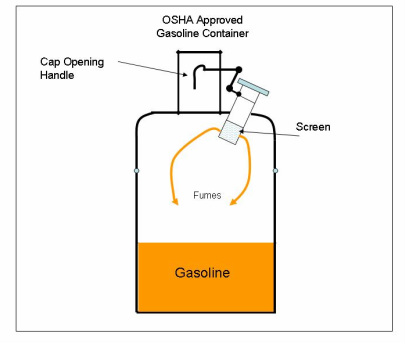|
|
|

Title: Safety and Gasoline
Description: Experts suggest that a single gallon of exploding gasoline can equal the force of fourteen sticks of dynamite. A 5-gallon container of gasoline can generate as much heat as 250 pounds of detonating dynamite, enough to completely demolish a street rod or most homes. It is the expanding vapors of gasoline that are extremely dangerous, even in cold temperatures. In a portable gasoline container the vapors can easily move out of the container. Always put a portable gasoline container in a well-vented area, never, for example, in the trunk of a car.
It is recommended that a gasoline can with a capacity of 1 gallon or more should have a flash-arresting screen at the outlet. Such screens prevent external fire or spark from igniting vapors within the can while the gasoline is being poured. This is shown in the illustration above. When working with gasoline containers, remember the following suggestions:
Description: Experts suggest that a single gallon of exploding gasoline can equal the force of fourteen sticks of dynamite. A 5-gallon container of gasoline can generate as much heat as 250 pounds of detonating dynamite, enough to completely demolish a street rod or most homes. It is the expanding vapors of gasoline that are extremely dangerous, even in cold temperatures. In a portable gasoline container the vapors can easily move out of the container. Always put a portable gasoline container in a well-vented area, never, for example, in the trunk of a car.
It is recommended that a gasoline can with a capacity of 1 gallon or more should have a flash-arresting screen at the outlet. Such screens prevent external fire or spark from igniting vapors within the can while the gasoline is being poured. This is shown in the illustration above. When working with gasoline containers, remember the following suggestions:
- Leave 1-2 inches of space in the container to allow for the expansion of gasoline at higher temperatures. If not, as gasoline expands, it may leak out and cause a serious hazard.
- Do not store gasoline cans in the home. Keep the containers in a garage, a well-ventilated shed, or an outbuilding away from your home.
- Always secure gasoline containers against upsets when transporting them.
- Never store gasoline cans with partial fuel for long periods of time. The gasoline will emit vapors and thus produce a hazard.
- Always cap openings for filling, pouring, or venting, except when filling the container or pouring the gasoline.
|
|